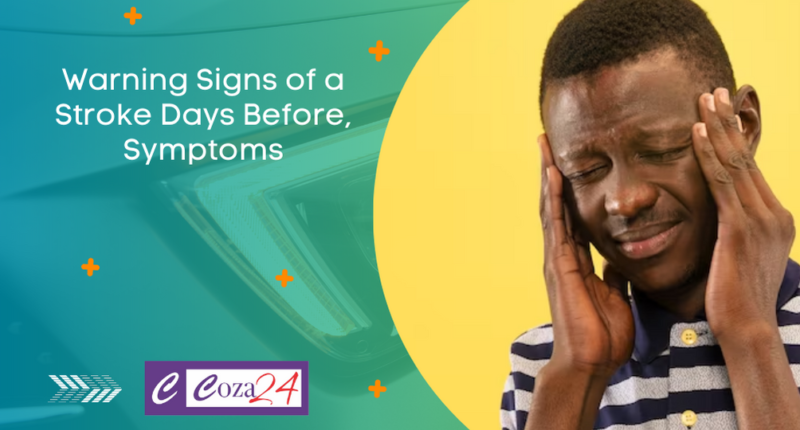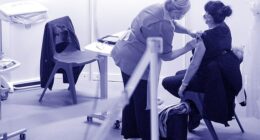When it comes to our health, knowledge is power. Understanding the warning signs of a stroke and its symptoms can be crucial in seeking timely medical attention and potentially saving lives. A stroke occurs when there is a sudden disruption of blood flow to the brain, resulting in brain cell damage. While strokes can happen suddenly, there are often warning signs that may appear days before the actual event. Being able to recognize these warning signs can be the key to preventing a stroke or minimizing its impact. In this article, we will explore the warning signs of a stroke that may manifest days before the actual occurrence, and the symptoms to watch out for.

Table of Contents
- 1 What is a Stroke?
- 2 The Importance of Recognizing Warning Signs
- 3 Warning Signs of a Stroke Days Before
- 4 Symptoms
- 5 The Role of Lifestyle in Stroke Prevention
- 6 Recognizing the Onset of a Stroke
- 7 Immediate Actions to Take
- 8 Seeking Medical Attention
- 9 Recovery and Rehabilitation
- 10 Life After a Stroke
- 11 Support and Caregiving
- 12 Conclusion
- 13 FAQs (Frequently Asked Questions)
What is a Stroke?
A stroke, also known as a cerebrovascular accident (CVA), occurs when there is a disruption in the blood supply to the brain. This can happen due to a blocked blood vessel (ischemic stroke) or a ruptured blood vessel (hemorrhagic stroke). When the brain does not receive enough oxygen and nutrients, brain cells begin to die, leading to potential long-term disabilities or even death.
The Importance of Recognizing Warning Signs
Recognizing warning signs of a stroke is vital, as it allows individuals to take immediate action. The faster someone receives medical treatment, the better the chances of a positive outcome. Many strokes can be prevented or significantly minimized if warning signs are detected early.
Warning Signs of a Stroke Days Before
The warning signs of a stroke can come on suddenly, but some people may experience symptoms a few days before a major stroke. These symptoms may include:
- A severe or unusual headache.
- Numbness or tingling in the face, arm, or leg, usually on one side of the body.
- Changes in vision, such as blurry vision, double vision, or loss of vision in one or both eyes.
- Difficulty speaking or understanding speech.
- Dizziness or loss of balance.
- Weakness or paralysis on one side of the body.
- Trouble walking or coordination.
- Sudden confusion or trouble thinking clearly.
If you experience any of these symptoms, it is important to seek medical attention immediately. A stroke is a medical emergency, and early treatment can help to minimize damage to the brain.
In addition to the symptoms listed above, some people may experience other warning signs of a stroke in the days leading up to the event. These may include:
- Changes in mood or behavior.
- Sudden fatigue.
- Changes in sleep patterns.
- Trouble swallowing.
- Changes in bowel or bladder habits.
If you experience any of these symptoms, it is important to talk to your doctor. While they may not be a sign of a stroke, it is always better to be safe than sorry.
Symptoms

Here are some additional things to know about the warning signs of a stroke:
- The symptoms of a stroke can vary from person to person.
- The symptoms of a stroke can come on suddenly or gradually.
- The symptoms of a stroke can be mild or severe.
- Not everyone who has a stroke experiences all of the warning signs.
If you think you or someone you know may be having a stroke, it is important to call 911 immediately. Early treatment is essential for minimizing damage to the brain.
The Role of Lifestyle in Stroke Prevention
While some stroke risk factors are beyond our control, such as age and family history, lifestyle choices play a significant role in stroke prevention. Adopting a healthy lifestyle can reduce the risk of strokes and improve overall well-being.
Recognizing the Onset of a Stroke
When a stroke occurs, it is crucial to recognize the symptoms promptly. The common signs of a stroke include:
- Sudden numbness or weakness in the face, arm, or leg, especially on one side of the body.
- Confusion or trouble understanding speech.
- Difficulty speaking or slurred speech.
- Trouble seeing in one or both eyes.
- Severe headache with no known cause.
Immediate Actions to Take
If you or someone you know exhibits any of the warning signs or symptoms of a stroke, it is essential to take immediate action. Every minute counts in stroke treatment, and the following steps can make a significant difference:
- Call Emergency Services: Dial emergency services immediately to seek professional medical help.
- Note the Time: Take note of when the symptoms first appeared, as this information is crucial for medical evaluation and treatment decisions.
- Do Not Drive: Avoid driving yourself or the affected person to the hospital, as the condition may worsen while on the road.
Seeking Medical Attention
Upon arriving at the hospital, the medical team will assess the individual’s condition and conduct various tests to determine the type and severity of the stroke. Treatment options may include medications, medical procedures, or surgery, depending on the cause and extent of the stroke.
Recovery and Rehabilitation
After surviving a stroke, recovery and rehabilitation are essential for regaining lost skills and achieving the best possible outcome. Rehabilitation programs may include physical therapy, occupational therapy, speech therapy, and psychological support.
Life After a Stroke
Life after a stroke may involve making adjustments to one’s lifestyle, including dietary changes, regular exercise, and adhering to medication schedules. Support from family and friends can be invaluable during this phase.
Support and Caregiving
For stroke survivors, the support of caregivers is crucial in aiding the recovery process. Caregivers play a significant role in providing physical and emotional support, assisting with daily activities, and ensuring medication adherence.
Conclusion
Recognizing the warning signs of a stroke days before the event can be life-saving. By being attentive to pre-stroke symptoms and taking immediate action, individuals can increase their chances of receiving timely medical care and reducing the potential impact of a stroke. Remember, every second counts when it comes to strokes, so never hesitate to seek medical attention if you suspect a stroke may be occurring.
FAQs (Frequently Asked Questions)
- Can young people experience strokes?
- Yes, while strokes are more common in older individuals, they can happen at any age, including young adults and even infants.
- Are all headaches warning signs of a stroke?
- No, most headaches are not related to strokes. However, sudden and severe headaches, especially if accompanied by other symptoms, should be taken seriously.
- Can a stroke be reversed?
- While stroke damage is often permanent, early treatment and rehabilitation can significantly improve a person’s recovery and quality of life.
- What are the risk factors for strokes?
- Some common risk factors include high blood pressure, high cholesterol, diabetes, smoking, obesity, and a sedentary lifestyle.
- How can I prevent a stroke?
- Adopting a healthy lifestyle, including regular exercise, a balanced diet, managing stress, and avoiding smoking and excessive alcohol consumption, can help reduce the risk of strokes
You may also like | 15 Foods Linked to Chronic Inflammation, According to Nutritionists









